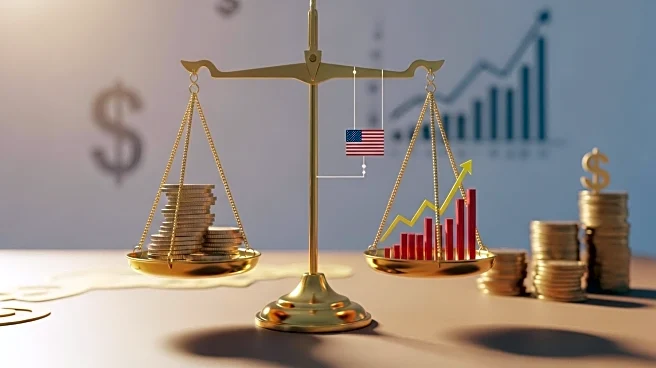What is the story about?
What's Happening?
Goldman Sachs analysts have reported that U.S. consumers are currently shouldering approximately 55% of the costs associated with tariffs imposed by President Trump on various imports. These tariffs, which have been in place for six months, cover products such as copper, steel, aluminum, and certain automobiles. The report suggests that the burden on consumers could increase to 70% if additional tariffs are implemented, particularly on items like furniture and kitchen cabinets. The tariffs have contributed to a rise in consumer prices, with the Bureau of Labor Statistics noting monthly increases since April. Inflation rates remain above healthy levels, with the Federal Reserve's preferred measure rising to 2.7% in August, surpassing the central bank's 2% target.
Why It's Important?
The imposition of tariffs has significant implications for the U.S. economy, affecting both consumers and businesses. As consumers bear a substantial portion of the tariff costs, their purchasing power is reduced, potentially leading to decreased consumer spending, which is a critical driver of economic growth. Businesses may face increased costs, impacting their profitability and potentially leading to higher prices for goods and services. The ongoing inflationary pressure could influence Federal Reserve policy decisions, including interest rate adjustments. Additionally, the tariffs could strain trade relations with key partners, particularly China, affecting international trade dynamics and economic stability.
What's Next?
The situation remains fluid, with potential developments including President Trump's threats to double tariffs on China, which could further exacerbate economic tensions. The U.S. Supreme Court is scheduled to hear arguments regarding the legality of the tariffs on November 5, which could lead to significant legal and economic ramifications depending on the outcome. Businesses may continue to strategize around inventory management and pricing to mitigate the impact of tariffs. The government shutdown has delayed the release of September's Consumer Price Index data, which will be crucial for assessing ongoing inflation trends.
Beyond the Headlines
The tariff situation highlights broader issues related to trade policy and economic strategy. The ethical considerations of imposing tariffs that disproportionately affect consumers and potentially exacerbate economic inequality are significant. Long-term shifts in trade relationships and supply chain dynamics may result from continued tariff policies, influencing global economic patterns. The legal challenges to the tariffs underscore the complex interplay between executive actions and judicial oversight in shaping economic policy.














